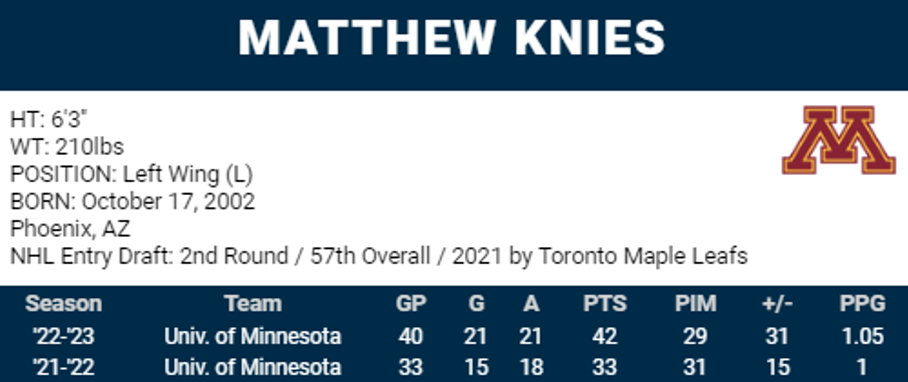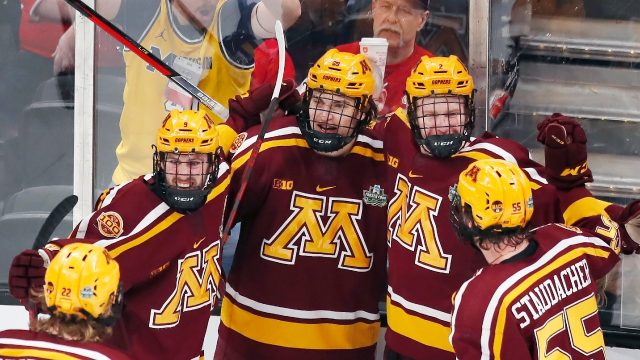
After months of speculation the Toronto Maple Leafs have signed their top prospect, Matthew Knies, to his entry-level contract. My media friends will provide their own insight into Knies and what his arrival means to the Leafs with the playoffs on the horizon. My role here at Sportsnet is to provide our readers with an NHL scouting perspective on teams and players.
Knies was drafted by the Leafs in the second round (57th overall) in 2021. Former Leafs Director of Amateur Scouting, John Lilley, (now the New York Rangers Director of Player Personnel and Amateur Scouting) and his staff made the call to draft Knies. There are times when a draft pick provides value above his draft slot and Knies is an example of a player who would be drafted much higher today in a re-draft scenario than he was in 2021.
With that in mind, here is my up-to-date scouting report on Matthew Knies, who was a Hobey Baker (given to the top player in NCAA men’s hockey) finalist, and winner of the Big Ten Player of the Year Award.
SCOUTING PROFILE
Knies is a big-body forward who impacts the game offensively and plays a responsible 200-foot game. His statistics speak to his identity.
A couple of things that stand out for me on his profile card:
• He’s got good NHL size: He’s 6-foot-3, 210 pounds
• Year over year point production has improved marginally
• Penalty minute totals speak to his discipline – and he’s remained constant
• Plus/minus more than doubled in a positive direction
KNIES’ ‘ELEMENT’
NHL prospects need to provide scouts with an element(s) that stands out compared to their peers. Some players are easily described in certain categories. Mitch Marner, for example, was always identified as a top-six, scoring, skill forward who played a light game physically.
Knies is a big body, power winger, who has added an extra pace to his game this season. He’s quicker to open space and tracks up and down the ice efficiently. The majority of his offence comes from between the hash marks and around the crease in the offensive zone.
He’s the kind of player who can absorb contact from opponents while extending plays along the boards. When he isn’t producing offence, Knies’ power game and three zone detail contributes to his team success. This season he proved he can provide the necessary compete and awareness to be used on the penalty kill.
VIDEO SCOUTING EXAMPLES
As I described earlier, Knies has added more explosiveness and open ice pace to his game. They are both important improvements.
In the following clip Knies (No. 89 on Minnesota) receives a pass in the neutral zone, explodes out of the gate, gets the edge on the zone entry, and drives to the net for a tuck:
Penalty killing takes a great deal of commitment and compete. In the next clip Knies scores a short-handed goal in a game versus Notre Dame. Breaking down the sequence, we see Knies track back, pressure his opponent, create a turnover, and then explode up ice to score off the rush:
Short-handed goals are a generally rare occurrence at any level. With that in mind, here is a clip that shows Knies providing energy on the penalty kill. His group wins the face-off and then he tracks up ice to get a sneaky shot on goal, then tracks all the way back to his zone where he picks up a loose puck and sends it the full length of the ice. The sequence disrupts St.Cloud’s power-play for over 35 seconds:
Finally, here is a sample of Knies providing a middle drive, power play goal off the rush. When he gets the puck in motion, he has great puck touch through the slot and driving to the net. Players his size are difficult to defend when they are playing fast and tracking through the middle of the ice:
NHL PROJECTION
Matthew Knies has more going for him than most college prospects entering the league at this time of the year. His combination of size, skill, and drive give the Toronto Maple Leafs a variety of role options for him to slot into.
He doesn’t need to score to have an impact. He can provide the subtle details that generally go unnoticed, but contribute greatly to overall team success.
Immediate Projection: 4F-3F at even strength. Net-front, second unit PP.
Long Term Projection: Top-six NHL power forward used in all situations








